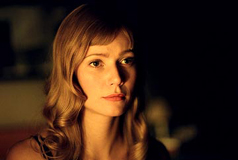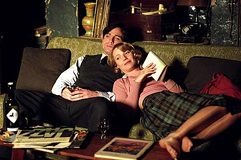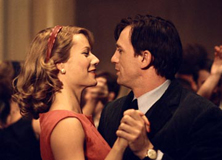Sylvia (Christine Jeffs, 2003)
 “Dying is an art,” are the first
words uttered in Christine Jeffs’ respectable biopic Sylvia,
but it’s tough to say that the film agrees. At least to the degree that Jeffs
finds art in writer Sylvia Plath’s death, she finds tragedy and waste. The
film strikes an even-handed tone that, while still respecting the legend that
Plath (Gwyneth Paltrow) would posthumously become, refuses to glorify the
author’s suffering. After all, to glorify her as an artist that needed to
suffer to create, it would need to let us get closer to than it ever does.
Everything in this sometimes inscrutable movie resists simple pigeonholing. Even
the opening credits, which place white titles a classy font on a black
background, slowly and subtly pull away from us as we read them. When the camera
finally moves back toward the action, and slowly zooms closer to Sylvia, we see
her reading a poem by her future husband, Ted Hughes (Daniel Craig). This makes
sense, since for the first half of Sylvia,
at least, it’s Hughes observation of his wife that helps us get closer to her.
“Dying is an art,” are the first
words uttered in Christine Jeffs’ respectable biopic Sylvia,
but it’s tough to say that the film agrees. At least to the degree that Jeffs
finds art in writer Sylvia Plath’s death, she finds tragedy and waste. The
film strikes an even-handed tone that, while still respecting the legend that
Plath (Gwyneth Paltrow) would posthumously become, refuses to glorify the
author’s suffering. After all, to glorify her as an artist that needed to
suffer to create, it would need to let us get closer to than it ever does.
Everything in this sometimes inscrutable movie resists simple pigeonholing. Even
the opening credits, which place white titles a classy font on a black
background, slowly and subtly pull away from us as we read them. When the camera
finally moves back toward the action, and slowly zooms closer to Sylvia, we see
her reading a poem by her future husband, Ted Hughes (Daniel Craig). This makes
sense, since for the first half of Sylvia,
at least, it’s Hughes observation of his wife that helps us get closer to her.
 Hughes and Plath share a tumultuous
romance that begins predictably, if in a manner more highbrow than usual. During
their brief courtship, these literary minds prattle off poetry at a rapid pace
and voraciously quote Chaucer and “Romeo and Juliet” (the death scene, natch)
at one another. It’s not long, however, before cracks in their relationship
begin to show. Sylvia becomes increasingly suspicious of her womanizing husband.
More troubling still, is Ted’s rising awareness of his wife’s mental
instability. The film details the dynamics of both their attraction to and
repulsion from one another with an unusual degree of sensitivity. Never does it
feel like Plath’s condition is being exploited to create headier drama.
There’s a well-staged scene where Plath’s mother (played by Paltrow’s real
life mother Blythe Danner) tells Hughes to, “Be good to her, always.” That
statement sounds like nothing less than a warning, yet the film thankfully
doesn’t posit that Hughes’ poor treatment of his wife is the main catalyst
in her self-destruction. More disturbing is a later scene between Plath and
Hughes during which she recounts her memories of her father’s death, all the
while bobbing up and down in a boat. It’s this literally unsettling scene that
marks the difference between the rather straightforward biographical recounting
that marks the first half’s tone and the more poetic mood piece that the
second half becomes.
Hughes and Plath share a tumultuous
romance that begins predictably, if in a manner more highbrow than usual. During
their brief courtship, these literary minds prattle off poetry at a rapid pace
and voraciously quote Chaucer and “Romeo and Juliet” (the death scene, natch)
at one another. It’s not long, however, before cracks in their relationship
begin to show. Sylvia becomes increasingly suspicious of her womanizing husband.
More troubling still, is Ted’s rising awareness of his wife’s mental
instability. The film details the dynamics of both their attraction to and
repulsion from one another with an unusual degree of sensitivity. Never does it
feel like Plath’s condition is being exploited to create headier drama.
There’s a well-staged scene where Plath’s mother (played by Paltrow’s real
life mother Blythe Danner) tells Hughes to, “Be good to her, always.” That
statement sounds like nothing less than a warning, yet the film thankfully
doesn’t posit that Hughes’ poor treatment of his wife is the main catalyst
in her self-destruction. More disturbing is a later scene between Plath and
Hughes during which she recounts her memories of her father’s death, all the
while bobbing up and down in a boat. It’s this literally unsettling scene that
marks the difference between the rather straightforward biographical recounting
that marks the first half’s tone and the more poetic mood piece that the
second half becomes.
 Somewhere along the way in Sylvia, the same fractured domestic bliss that resulted in Plath
baking compulsively to avoid coming to terms with her work begins to manifest
itself in more insidious ways. Household items like the blare of the
telephone’s ring and the oppressive murk of Plath’s London lighting scheme
distort in her mind to create a homespun hell. Jeffs and her lead actress
conspire to handle the hard task of helping us to understand Sylvia’s madness
without making it feel like an opportunity to demonstrate Paltrow’s acting
acumen. That being said, the actress and director, who devises images rich
enough that they fill in some of the gaps in the screenplay, seem to be giving
us more than the script is. Perhaps it’s the refusal to paint Plath as either
a genius or madwoman that results in the script’s wishy-washy feel, but if so,
that’s an honorable reason to fail. One never feels the screenplay is less
than adequate, exactly, but at the same time it’s never a brilliant one, and
that lack of surer perspective is the downfall of the movie, to the extent that
it fails. Despite only presenting us with two main characters, the film never
gets close to either. Hughes seems well-developed in the first half of the
movie, but then begins to play the exasperated straight man to his wife’s
insanity. The moment each of them feels most alive is when they are tearing
apart the other, which only further obscures audience identification. Even the
output of each author remains a bit sketchy. Though the film seems to suggest
that Plath needs her pain to write, and argues that her writing is cathartic, it
rarely quotes from it, so we can’t draw parallels between the artist’s life
and art. Because of its complete insistence of seriousness, Sylvia
feels like something of a chore at times. The realization that anything less
than a serious treatment would have felt exploitative assuages those complaints,
however. It’s very tough for a director to build momentum in this kind of
story without cheapening it (consider, for example, the facile nature of the
baby bath scene in A Beautiful Mind to
consider what manipulative traps Sylvia deftly avoids). The film’s story is one that presents very little
to dramatize, but that little has been dramatized very well.
Somewhere along the way in Sylvia, the same fractured domestic bliss that resulted in Plath
baking compulsively to avoid coming to terms with her work begins to manifest
itself in more insidious ways. Household items like the blare of the
telephone’s ring and the oppressive murk of Plath’s London lighting scheme
distort in her mind to create a homespun hell. Jeffs and her lead actress
conspire to handle the hard task of helping us to understand Sylvia’s madness
without making it feel like an opportunity to demonstrate Paltrow’s acting
acumen. That being said, the actress and director, who devises images rich
enough that they fill in some of the gaps in the screenplay, seem to be giving
us more than the script is. Perhaps it’s the refusal to paint Plath as either
a genius or madwoman that results in the script’s wishy-washy feel, but if so,
that’s an honorable reason to fail. One never feels the screenplay is less
than adequate, exactly, but at the same time it’s never a brilliant one, and
that lack of surer perspective is the downfall of the movie, to the extent that
it fails. Despite only presenting us with two main characters, the film never
gets close to either. Hughes seems well-developed in the first half of the
movie, but then begins to play the exasperated straight man to his wife’s
insanity. The moment each of them feels most alive is when they are tearing
apart the other, which only further obscures audience identification. Even the
output of each author remains a bit sketchy. Though the film seems to suggest
that Plath needs her pain to write, and argues that her writing is cathartic, it
rarely quotes from it, so we can’t draw parallels between the artist’s life
and art. Because of its complete insistence of seriousness, Sylvia
feels like something of a chore at times. The realization that anything less
than a serious treatment would have felt exploitative assuages those complaints,
however. It’s very tough for a director to build momentum in this kind of
story without cheapening it (consider, for example, the facile nature of the
baby bath scene in A Beautiful Mind to
consider what manipulative traps Sylvia deftly avoids). The film’s story is one that presents very little
to dramatize, but that little has been dramatized very well.
57
10-28-03
Jeremy Heilman